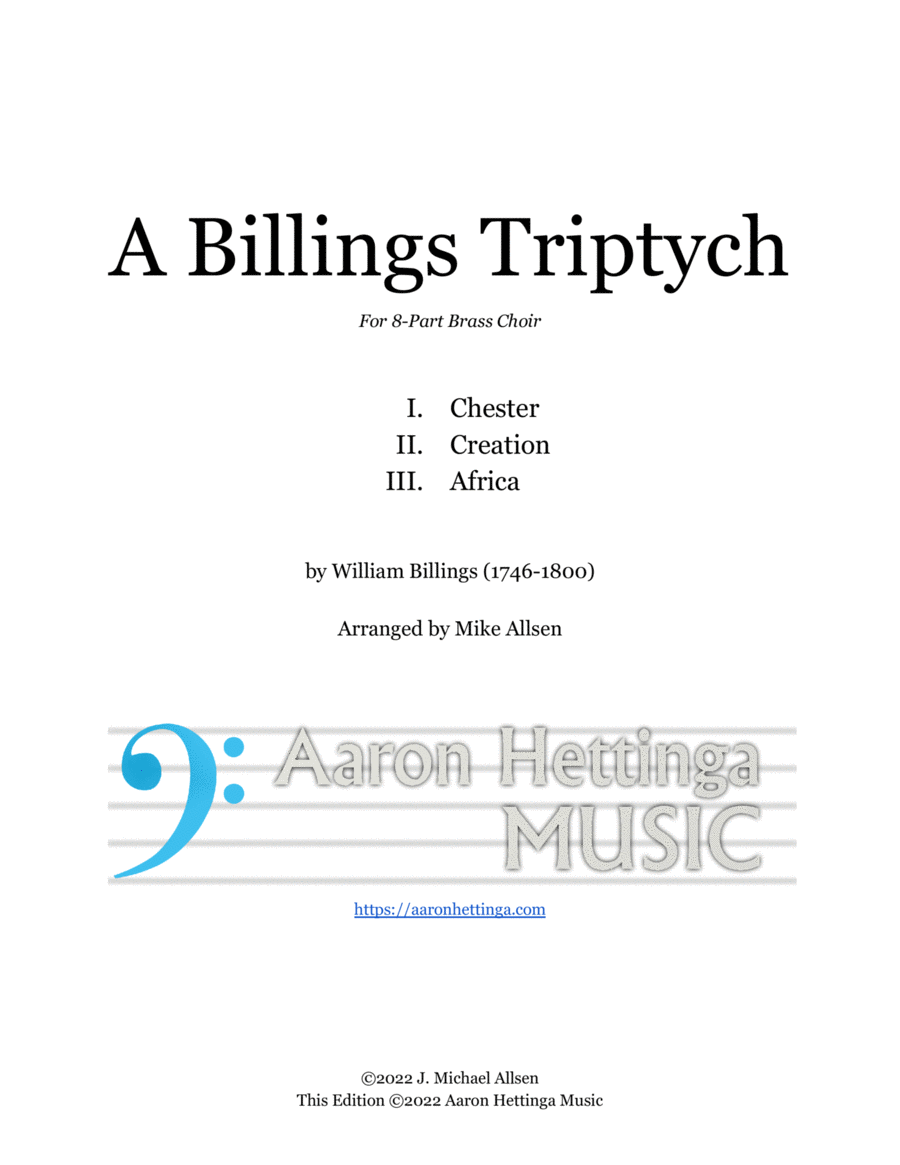Brass Ensemble Horn,Trombone,Trumpet,Tuba - Level 3 - Digital Download SKU: A0.1030615 Composed by William Billings. Arranged by Mike Allsen. Classical,Praise & Worship,Renaissance,Sacred,Spiritual. Score and parts. 41 pages. Aaron Hettinga #636010. Published by Aaron Hettinga (A0.1030615). William Billings (1746-1800) was North Americaâs first great choral composer. He spent most of his life in Boston, working at various times as a tanner or as minor civic official, and occasionally as a church musician. Billings seems to have had little formal music training, but when he was just 22, he also set himself up as an itinerant singing-master, teaching âsinging-schools,â where children and adults could learn the rudiments of musical notation and solfege. To feed the market he and other singing-masters had helped to create, Billings published six collections of music, mostly for SATB voices, The first of these, The New England Psalm-Singer (1770) featured a frontispiece engraved by his friend Paul Revere. Billings was fairly prosperous by 1780s, but his good fortune faded in the 1790s. His final collection of music, The Continental Harmony of 1794, was published for his benefit by a group of Boston friends. Billings died destitute in 1800. Billings composed some 340 pieces, mostly collected in his printed editions. This music has a rough-edged and sturdy beauty that is distinctly different from anything in contemporary Europe. The vast majority of Billingsâs works were hymns or âpsalm tunes.â He was particularly attracted to the great English hymn-writer Isaac Watts (1674-1748), though Billings himself wrote verses for many of his hymns. One of the most famous Billings âpsalm tunes,â Chester is not a Christian hymn, but rather a patriotic song of defiance directed against the British. Billings spent nearly all of the Revolutionary War in Boston and made no secret of his patriot sentiments. Chester was first published in 1770, but when he republished it in his The Singing-Masterâs Assistant during the height of the war in 1778, Billings added a verse calling out the âinfernal leagueâ of the leading British generals Howe, Burgoyne, Clinton, Prescot and Cornwallis. Many brass-players will know Chester from the finale of William Schumanâs 1957 band piece A New England Triptych. Billings also composed over 50 âfuging-tunesââa genre that usually included a short introduction and a repeated contrapuntal section. (These fuging sections usually begin with imitation, but they are otherwise not at all like classical fugues written in Europe at the time.) The fuging-tune Creation is one of his later works, published in The Continental Harmony of 1794, and experiments with the form. It sets two verses of the Watts hymn âWhen I With Pleasing Wonder Standâ though final line of verse 1 is repeated in a striking phrase that suddenly moves twice as fast (m.15). The fuging section begins in m.30, and rather than the usual exact repeat, Billing writes an entirely new and more elaborate second section beginning at m.44. Billings first published the simple but beautiful Africa in 1770, and published a revised version in 1778; the later version appearing with the Isaac Watts hymn âNow Shall My Inward Joys Arise.â I first arranged Africa in 1995, for the Glenwood Moravian Trombone Choir (Madison, WI), and I edited it for this publication. Phrasing and articulations marked here reflect the original vocal texts. Africa has long been a favorite of the Glenwood group. Chester and Creation were arranged in 2022. Mike Allsen February 2022.
